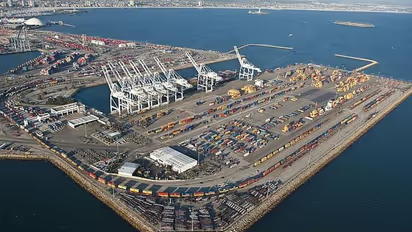Chabahar port project to benefit landlocked Afghanistan Central Asia: India

Synopsis
The remarks by Ministry of External Affairs spokesperson Randhir Jaiswal came days after the United States warned of sanctions following India and Iran sealing the deal. India and Iran on Monday signed a 10-year agreement that provided for Indian operations at the Chabahar port.
India on Friday said a "narrow view" should not be taken on the long-term agreement between New Delhi and Tehran on the Chabahar port project as it would benefit landlocked Afghanistan, Central Asia and the entire region.
Days back, the United States’ State Department warned New Delhi of the potential risk of economic sanctions that any entity considering a business deal with Iran. New Delhi and Tehran inked a 10-year deal with Tehran to operate the Chabahar port.
On Monday, US Department of State Principal Deputy Spokesperson Vedant Patel said: “So, we’re aware of these reports that Iran and India have signed a deal concerning the Chabahar port…I will just say, as it relates to the United States, US sanctions on Iran remain in place and we’ll continue to enforce them.”
India on Friday added that a broad perspective should be adopted regarding the long-term agreement between the two countries concerning the Chabahar port project. Ministry of External Affairs spokesperson Randhir Jaiswal said, “The Indian company, India Ports Global Limited has been operating the port since 2018 on an interim lease. Now, we have concluded a long-term agreement which is essential for port operation.”
He said, “Since then, we have provided humanitarian assistance including 85,000 metric tons of wheat, 200 metric tons of pulses and 40,000 litres of pesticide Malathion, to Afghanistan through this port.”
“The US has shown an understanding of the importance of the Chabahar Port operations for continued humanitarian supplies to Afghanistan and to provide Afghanistan with economic alternatives,” Jaiswal added. Situated in Iran's Sistan-Balochistan province on the southern coast, the Chabahar port is a joint initiative between India and Iran aimed at enhancing connectivity and trade relations in the region.
Stay updated with the Breaking News Today and Latest News from across India and around the world. Get real-time updates, in-depth analysis, and comprehensive coverage of India News, World News, Indian Defence News, Kerala News, and Karnataka News. From politics to current affairs, follow every major story as it unfolds. Download the Asianet News Official App to stay informed anytime, anywhere.